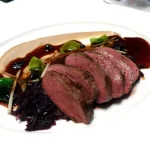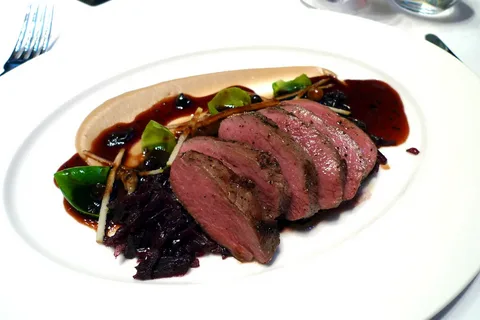Ground venison recipes, a rich and versatile meat, is celebrated not only for its distinct taste but also for its nutritional benefits. This guide delves deep into ground venison recipes, providing you with everything you need to know to incorporate this lean, gamey meat into your cooking repertoire.
Introduction to ground venison recipes
Ground venison is the ground meat of deer, often praised for being leaner and healthier than many other red meats. It’s a popular choice for those looking to diversify their diet with game meat, which is known for its deep, earthy flavors and high protein content.
Preparing Ground Venison: Best Practices
Properly handling and preparing ground venison can make a significant difference in the flavor and texture of your meals:
- Storage and Thawing: Always thaw ground venison in the refrigerator to ensure safety and maintain quality.
- Cooking Tips: To keep venison moist and flavorful, cook it at lower temperatures and consider adding a small amount of fat, like oil or butter, since it is much leaner than other meats.
For a detailed look into cooking techniques for venison, check out this comprehensive guide on how to cook venison.
Classic Ground Venison Recipes
Venison Burgers
- Ingredients:
- 1 lb ground venison
- Salt and pepper to taste
- Optional additions: minced onion, garlic, or herbs
- Method:
- Mix the venison with your chosen seasonings.
- Form into patties and grill or fry until fully cooked.
- Serve on buns with your favorite toppings.
Venison Meatloaf
- Ingredients:
- 1 lb ground venison
- 1 cup bread crumbs
- 1/2 cup milk
- 1 beaten egg
- Seasonings to taste
- Method:
- Combine all ingredients and shape into a loaf.
- Bake in a preheated oven at 375°F for about 1 hour.
What should I mix with ground venison?
Ground venison is leaner than many other types of meat, which makes it a healthy but sometimes challenging option to cook with due to its tendency to dry out. To keep your venison dishes moist and flavorful, consider mixing it with several ingredients:
Fats
- Pork Fat: Mixing a bit of pork fat or bacon with ground venison can help maintain moisture and add a rich flavor.
- Butter or Olive Oil: A little butter or olive oil mixed into the meat before cooking can help enhance juiciness and flavor.
Aromatic Vegetables
- Onions and Garlic: These are classic flavor enhancers and add moisture as well as taste.
- Bell Peppers: Adding finely chopped bell peppers provides moisture and sweetness to counterbalance the robust flavor of venison.
Binders and Extenders
- Breadcrumbs: These help to bind the meat mixture and retain moisture during cooking.
- Eggs: Adding an egg to the ground venison mixture can help in binding the ingredients together, making it easier to form into patties or meatballs.
Liquids
- Stocks or Broths: Using a bit of beef, chicken, or vegetable stock can add flavor and moisture to the venison.
- Sauces: Incorporating sauces like Worcestershire sauce, soy sauce, or barbecue sauce can enhance the moisture and flavor.
Seasonings and Spices
- Fresh Herbs: Herbs like thyme, rosemary, and sage complement the gamey flavor of venison well.
- Spices: Spices such as juniper berries, cumin, coriander, and smoked paprika can enhance the natural flavors of venison without overpowering it.
Additional Mix-Ins
- Cheese: Adding cheese like feta or blue cheese can introduce fat and tangy flavors, which complement the venison nicely.
- Vegetables: Grated vegetables such as carrots, zucchini, or mushrooms can add both flavor and moisture to the meat.
How should ground venison be cooked?
Cooking ground venison properly is crucial due to its low fat content, which can lead to dry, tough results if not handled correctly. Here are several tips on how to cook ground venison effectively, ensuring it remains juicy and flavorful:
1. Mix with Fat
Because venison is so lean, mixing it with a small amount of fat can help. Common options include bacon fat, pork fat, or even a bit of olive oil or butter. This helps keep the venison moist and tender during cooking.
2. Avoid Overcooking
Venison cooks faster than beef due to its lower fat content. Monitor the cooking closely and remove it from heat as soon as it reaches the desired doneness. For ground venison, cook until it’s no longer pink inside, reaching an internal temperature of 160°F (71°C) to ensure safety without overcooking.
3. Use Moist Cooking Methods
Incorporating moisture into your cooking method can help prevent the meat from drying out. Consider these techniques:
- Pan Frying/Sautéing: Add broth, wine, or a sauce to the pan to create more steam and moisture as the meat cooks.
- Baking: When making dishes like meatloaf or casseroles, include moist ingredients like diced tomatoes, broth, or sauces.
- Slow Cooking: Ground venison works well in slow-cooked sauces and stews where it can simmer and absorb flavors without losing moisture.
4. Cook at Lower Temperatures
Cooking ground venison at a lower temperature can help prevent the meat from drying out too quickly. Whether you’re grilling, frying, or baking, moderate the heat to avoid toughening the meat.
5. Season Well
Venison benefits from good seasoning. Using robust herbs and spices can enhance its natural flavors and improve the overall taste of the dish. Consider marinades or spice mixes that complement its rich flavor.
6. Use a Meat Thermometer
To avoid guesswork and ensure your venison is cooked perfectly, use a meat thermometer. This tool can help you achieve the right temperature without overcooking the meat.
7. Rest the Meat
Allow the cooked ground venison to rest for a few minutes after cooking. This helps redistribute the juices throughout the meat, making it more tender and flavorful when you serve it.
Example Recipes
Here are a few recipe ideas where ground venison can shine:
- Venison Burgers: Mix ground venison with a little pork fat, form into patties, and grill them carefully, making sure not to overcook.
- Venison Chili: Slow cook ground venison with beans, tomatoes, and spices for a hearty dish.
- Venison Meatballs: Combine ground venison with breadcrumbs, eggs, and herbs, and bake or fry until just done.
How do you make ground venison taste better?
Making ground venison taste better involves enhancing its natural flavors and compensating for its low fat content, which can cause dryness and a gamey taste if not cooked properly. Here are some effective strategies to improve the flavor and texture of ground venison:
1. Add Fat
- Mix with Fatty Meats: To counteract the lean nature of venison, mix it with fattier meats like pork or beef. This not only adds moisture but also helps balance the strong flavors.
- Incorporate Cooking Fats: Adding a bit of olive oil, butter, or bacon fat while cooking can help enhance the juiciness and flavor profile of the meat.
2. Use Marinades
- Acidic Ingredients: Marinades containing vinegar, wine, or citrus juices can help tenderize the meat and add a rich layer of flavor.
- Spice Blends: Using bold spices and herbs in the marinade can also mask any gamey flavors. Consider ingredients like garlic, rosemary, juniper berries, or smoked paprika.
3. Employ Aromatic Vegetables
- Cook with Onions and Garlic: These not only add moisture but also a sweetness that complements the robust flavor of venison.
- Include Bell Peppers or Celery: These vegetables can add a subtle flavor and extra moisture to dishes like chilis, sauces, or meatloaves.
4. Season Generously
- Herbs and Spices: Ground venison pairs well with strong herbs and spices. Experiment with thyme, sage, bay leaves, coriander, and cumin to enhance its flavor.
- Salt and Pepper: Proper seasoning is crucial. Salt helps bring out the natural flavors of the meat, and freshly ground black pepper adds a nice kick.
5. Cooking Techniques
- Slow Cooking: Cooking ground venison slowly in stews or sauces can help the meat absorb flavors from other ingredients and ensure it stays moist.
- Avoid Overcooking: Keeping a close eye on the cooking time and using a meat thermometer can prevent the meat from becoming tough and chewy.
6. Create Flavorful Combinations
- Mix with Bacon: Adding chopped bacon not only infuses fat but also a smoky flavor that goes well with the taste of venison.
- Incorporate Cheese: Mixing in or topping dishes with cheese like Parmesan or sharp cheddar can add a depth of flavor and richness.
7. Pair with Complementary Sides
- Starchy Sides: Serve ground venison with potatoes, rice, or polenta, which can soak up flavors and add a comforting texture to your meal.
- Bright, Acidic Components: Adding a squeeze of lemon or a dash of vinegar can brighten the dish and cut through the richness.
Is venison healthier than beef?
Yes, venison is generally considered healthier than beef for several reasons, primarily due to its nutritional content and lower fat levels. Here’s a detailed comparison to illustrate why venison might be a better choice for those looking to maintain a healthier diet:
Lower Fat Content
- Venison: This meat is naturally lean, with less intramuscular fat than beef. This results in lower calorie content and less saturated fat, which is better for heart health.
- Beef: Typically has more fat, which can contribute to higher calories and greater amounts of saturated fat, depending on the cut.
Higher Protein Content
- Venison: Provides a high protein content, which is beneficial for muscle repair and building. Protein also helps in feeling fuller for longer, which can aid in weight management.
- Beef: Also high in protein but often comes with more fat, which can be less ideal for those on a strict calorie-controlled diet.
Rich in Vitamins and Minerals
- Venison: High in B vitamins, particularly B12, which is crucial for red blood cell formation and neurological function. It also contains significant amounts of zinc, iron, and selenium.
- Beef: While beef is also rich in B vitamins and minerals like iron and zinc, the higher fat content can sometimes overshadow these benefits.
Lower in Cholesterol
- Venison: Generally contains less cholesterol than beef, making it a healthier option for those concerned about cardiovascular health.
- Beef: Higher cholesterol levels linked to higher saturated fat content can contribute to an increased risk of heart disease if consumed in large amounts.
Game vs. Farmed Meat
- Venison: Most venison comes from wild game, which means it can be more sustainable than farmed meat. Wild game feeds on natural vegetation, which can contribute to a more complex flavor profile and a meat that is free from antibiotics and hormones.
- Beef: Conventionally raised beef often involves feedlots and grain-based diets, including potential use of antibiotics and hormones. However, grass-fed beef shares many of the health benefits of venison, being lower in fat and higher in key nutrients like omega-3 fatty acids.
Environmental Impact
- Venison: Hunting wild deer can be part of sustainable wildlife management. It helps maintain population levels that are in balance with ecological capabilities, which can be beneficial for the environment.
- Beef: Beef production, especially in feedlots, is resource-intensive, requiring more water, feed, and land, which can have a greater environmental footprint.
Taste and Culinary Use
- Venison: Often considered to have a richer, more complex flavor than beef, it can be an acquired taste due to its “gamey” notes.
- Beef: Widely accepted for its taste and versatility in various cuisines, beef is generally easier to cook with and less likely to become tough if overcooked.
Innovative ground venison recipes
Explore beyond traditional dishes and try these creative recipes that highlight the versatility of ground venison:
Spicy Venison Chili
- Ingredients:
- 1 lb ground venison
- Onions, garlic, peppers, diced
- Tomatoes, kidney beans, chili spices
- Method:
- Cook the venison with onions and garlic, add other ingredients, and simmer to blend the flavors.
Venison Tacos
- Ingredients:
- 1 lb ground venison
- Taco seasoning or a blend of cumin, chili powder, and paprika
- Tortillas and taco fixings
- Method:
- Brown the venison with the seasoning.
- Serve in tortillas with toppings like lettuce, tomato, and cheese.
Expert Tips for Cooking with Ground Venison
- Keep it Moist: Since venison is very lean, add fats like olive oil or bacon bits to keep your dishes moist and tasty.
- Slow Cooking: Venison benefits from slow cooking methods, which help tenderize the meat and deepen the flavors.
Incorporate ground venison into your diet for a tasty and healthy alternative to traditional meats. For those looking for more information on preparing venison or other game meats, visit Granny’s Bites on Game Meats for recipes and tips.
Pairing Side Dishes with Venison
Choosing the right side dishes can enhance your ground venison meals, balancing flavors and textures. Here are some excellent pairings:
Starchy Sides
- Roasted Potatoes: Their crispy exterior and soft interior make them a hearty complement to venison dishes.
- Sweet Potato Mash: The natural sweetness of sweet potatoes pairs beautifully with the savory richness of venison.
- Polenta: Creamy polenta is a comforting base for stews and saucy venison preparations.
Vegetable Sides
- Steamed Asparagus: Its mild flavor and crisp texture complement the richness of venison well.
- Sauteed Brussels Sprouts: Their slight bitterness is a great counterbalance to the sweet or spicy profiles of some venison dishes.
- Roasted Root Vegetables: Carrots, turnips, and beets offer a sweet earthiness that matches the gamey notes of venison.
Sauces and Seasonings for Ground Venison
Enhancing venison with the right sauces and seasonings can transform your dish. Here are a few suggestions:
- Rich Red Wine Sauce: A classic choice that adds depth and complements the natural flavors of the meat.
- Cranberry Sauce: Its tartness cuts through the richness of venison, making it ideal for burgers or meatloaf.
- Juniper Berry Sauce: Juniper berries have a pine-like taste that works well with game meats, offering a distinctive flavor profile.
Frequently Asked Questions About Ground Venison
How do I prevent ground venison from drying out while cooking?
- Avoid Overcooking: Since venison is lean, it’s crucial to cook it just until it’s done, no longer, to maintain moisture.
- Add Fat: Mixing a little fat, like pork or beef fat, can help keep venison juicy during cooking.
Is ground venison healthier than ground beef?
- Lower Fat Content: Venison typically has less fat than beef, which can be beneficial for those watching their fat intake.
- Rich in Nutrients: It’s high in protein, iron, and B vitamins, making it a nutritious option.
Can I use ground venison the same way as ground beef in recipes?
- Versatile Use: Yes, ground venison can replace ground beef in most recipes, such as in burgers, meatloaf, or tacos, adjusting cooking times and seasonings as needed due to its lower fat content.
Conclusion
Ground venison is a flavorful, nutritious alternative to more common meats and offers a new dimension to many traditional dishes. Whether you’re making a simple burger or an elaborate stew, venison provides a delicious and healthy base that can elevate your cooking. Experiment with the recipes and tips provided to make the most out of this versatile meat. Explore more game meat recipes and cooking tips at Granny’s Bites Game Meat Recipes, and discover new favorites to add to your culinary repertoire
Print
ground venison recipes
- Author: Haifajackson
- Total Time: Approximately 45 minutes
Description
Discover a variety of ground venison recipes that offer a healthy twist on traditional dishes. Enjoy flavorful, lean meals suitable for any occasion.
Ingredients
- 1 lb ground venison
- 1 onion, finely chopped
- 2 cloves garlic, minced
- 1 cup breadcrumbs
- 1 egg
- Salt and pepper to taste
- Optional: vegetables, herbs, spices, and sauces depending on the recipe
Instructions
- Mix Ingredients: Combine ground venison, onion, garlic, breadcrumbs, and egg in a bowl. Season with salt and pepper.
- Form and Cook: Shape the mixture into patties, meatballs, or use it as filling in sauces. Cook according to the chosen recipe—either fry, bake, or simmer.
- Serve: Pair with your choice of sides or incorporate into pasta, tacos, or sandwiches.
Notes
- Ground venison is lean; mixing in a small amount of pork or beef fat can help keep dishes moist.
- Consider marinating or seasoning well to enhance flavors and mitigate the gamey taste.
- Prep Time: 15 minutes
- Cook Time: Varies by recipe (approximately 30 minutes for most dishes)
Nutrition
- Calories: 160 kcal
- Fat: 7 g
- Carbohydrates: 0 g
- Protein: 22 g
- Cholesterol: 90 mg

